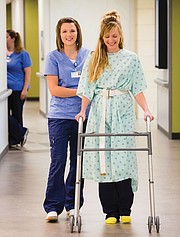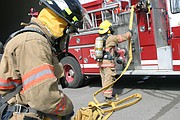North Idaho College’s Workforce Training Center offers opportunities for employees, employers post-COVID
Just as a forest fire makes way for new life, an economic crisis — or a global pandemic — forces societies to re-examine, re-evaluate and find new paths forward.
When times seem dark, education can offer illumination on those paths.
And those paths to stability and security can begin at North Idaho College.
"The great thing about NIC, and one of the things I love about NIC and am so excited about, is that they offer a variety of options, no matter what it is you want to do," said Brenda Hamilton, coordinator for apprenticeship programs at NIC's Workforce Training Center.
For those who are considering working as electricians, plumbers or HVAC (heating, ventilation and air conditioning) technicians, the Workforce Training Center offers four-year programs that are a sliver of the cost of traditional university plans. For about $1,500 per year, trainees can learn new trades without any prior experience in these industries.
"And the great thing about them is you go to school and you also work," Hamilton said. "You have a job where you're making a wage while you're in school as well. At the end of your training, you can test to be a journeyman, and make a very good livable wage."
While learning the skills needed for prosperity in these trades, students will apprentice with local businesses and be paid hourly, reducing the sting of the cost and the need for student loans.
"The employers you work for, if you’re serious and getting good grades, they will pay some of that cost, plus your hourly wage," Hamilton said. "And right now, we are so busy. Even through the COVID crisis, electricians, plumbers and HVAC techs continued to work, and they make very good wages.”
Those who graduate receive certificates of completion, and they'll have opportunities to increase their value to employers.
"They'll be ready to go to the department of building safety and take their journeyman test," Hamilton said. "However, they can also take that four years of experience and go to NIC and have it turned into credit. If they take 12 to 15 more credits, such as an English, a math and a science, they can get an associate’s degree. They can come away with an associate's degree and a journeyman license."
Average salaries for these jobs begin around $14 per hour in Idaho, but increase with experience and certifications. According to www.indeed.com, an employment search website, HVAC techs average more than $43,500 per year, plumbers average more than $46,300 per year and journeyman electricians average nearly $69,000 per year.
Another route for those seeking change is health care.
"Clearly, there's always a need for health care workers," said Dotty Heberer, health professions coordinator at the Workforce Training Center. "We are very fortunate to be able to provide accelerated training for people to get into the workforce."
The health care programs at the Workforce Training Center are not confined to semesters, Heberer explained, making it convenient to enroll.
"They can jump in literally monthly," she said.
The restorative assistant program, which increases career potential for certified nursing assistants, takes five weeks and costs about $600. The program to become a CNA is about $1,000 and takes about 11 weeks, Heberer said. The longest and most expensive is the medical assistant apprenticeship program, which spans eight months and costs about $6,000.
However, Heberer said scholarships are available, as are payment plans and Sallie Mae student loans.
Upon completion, grads can look forward to making between $12 and $20 to start.
"With an apprenticeship, wage progressions are already built into those federal standards," Heberer said. "It's a nice pathway, especially for incumbent workers. They can start at a lower wage, and as they progress with skills, they get a higher wage, and once they earn their credentials there’s another pay increase.”
Vick Isakson, director of workforce training and community education for NIC, said anyone can be trained for any certificate program.
"We train firefighters, truck drivers, health professionals, computer programmers, dental assistants, nursing assistants, plumbers, electricians, and much more," she said.
And, when employers have needs, NIC and the Workforce Training Center have those covered, too, with
"We’re here for employers as much as future employees,” Isakson said.
"The coronavirus has a lot of folks out of work or reassessing their career path," she said. "It’s a tough time for everyone. But times like this can also be a catalyst for positive change.”
Info: www.nic.edu/wtc or 208-769-3214





